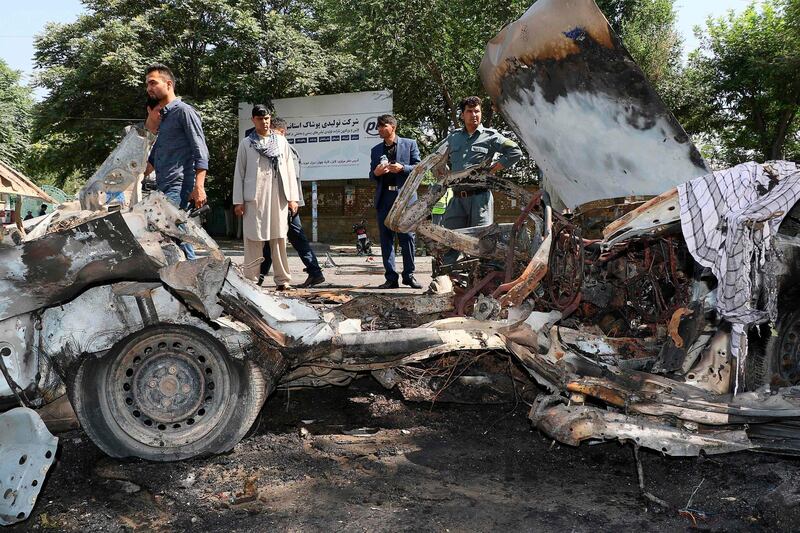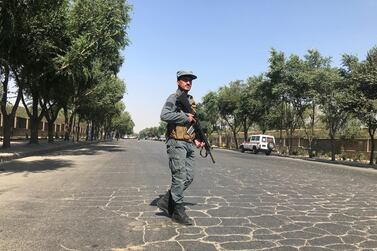An investigation by Afghanistan’s spy agency this month led to the arrest of four ISIS recruiters, three of whom were teachers at the country’s largest university, raising questions about the ability of extremists to operate in the capital and recruit from the country’s young students.
Of the three suspects, Mubashir Muslimyar was a lecturer, while Zahir Daee and Mohammad Maroof Rasikh were teachers of religious studies at Kabul University, the National Directorate of Security (NDS) said in a statement on July 8.
The suspected insurgent recruiters were detained in Kabul and are believed to have played a role in a spate of recent attacks in the Afghan capital, including against a bus carrying civil servants on June 4 and the September bombings of a wrestling club in which 21 people died.
Beyond their involvement in organising attacks, the NDS investigation raises questions about their efforts to radicalise and recruit students.
The teachers’ alleged activities became known after former students of Mr Muslimyar were detained following the aforementioned attacks and identified him as a recruiter.
One 24-year-old graduate who studied Information and Communication Technology under Mr Muslimyar in 2014 told The National that his former lecturer had exhorted students to "join jihad against the infidel government."
“He often started debates in the class against the government,” said the former student, who asked to remain anonymous. “He used to tell us that this government is made up of pagans and is against Islam.”
Students complained about Mr Muslimyar’s views but the faculty never took action, the graduate said.
In a now-deleted tweet, a woman who said she had been a student of Mr Muslimyar claimed he had been opposed to co-education and had deducted marks from female students who wore Western-style clothing.
The woman declined to comment further when contacted by The National but said she had deleted the tweet after receiving threats.
Following the arrests, security officials and academics say they are concerned about radicalisation of youth on university campuses.
"Teachers and religious scholars who support jihadist groups hold a lot of influence over the community," a security official close to the investigation told The National on condition of anonymity. "Young students in their care are exposed to harmful ideologies when they are extremely vulnerable and can be manipulated to do something wrong."
Aside from Kabul University, authorities are also concerned about ISIS recruitment at Nangarhar University and Al Beroni University in Kapisa, the official said.
A report this year by the Afghan Institute for Strategic Studies found that half of 373 students surveyed at three major Afghan universities supported an Islamic Emirate or Caliphate as a preferred system of political governance.
The Taliban refers to their insurgent shadow government as the Islamic Emirate of Afghanistan.
About 20 per cent of the students surveyed in Kabul, Herat and Nangarhar were opposed to secularism or living alongside religious groups other than their own, While three quarters supported the idea of proslytesing Islam globally.
Hizb ut-Tahrir, an insurgent group that operates in region, called the report anti-Islamic and secularist.
The report’s author Ramin Kamangar blamed a lack of diversity and inclusivity in university curricula for growing intolerance and susceptibility to radicalisation among students.
"The textbooks of Islamic studies are not academic or standardised," he told The National. "They speak about the world as right or wrong – presenting the world to the students in form of ideological black and white.
The system does not encourage critical thinking or creativity, he said, producing graduates who are unable to reason independently – and therefore vulnerable to recruitment to extremist groups.
Security officials meanwhile are keeping a close eye on higher learning institutions across the country.
“Many students who come to these universities hail from villages and rural areas; some are even returning from Pakistani refugee camps,” the security official said. “We can’t expect them to have the same kind of thoughts and ideologies as urban students from Kabul. Bringing youth of different thinking has also been concerning in terms of spreading influence of certain harmful ideologies.”
The case is not the first time lecturers have been accused of recruiting for Afghanistan’s insurgencies. In February, Abu Obaidullah Mutawakil, a university lecturer and Imam at a mosque in Kabul, was arrested for recruiting “hundreds of youth” for ISIS. He remains in NDS custody and has supposedly confessed to recruiting several students, including his own nephew, who reportedly carried out a suicide bombing in Kabul last year.






